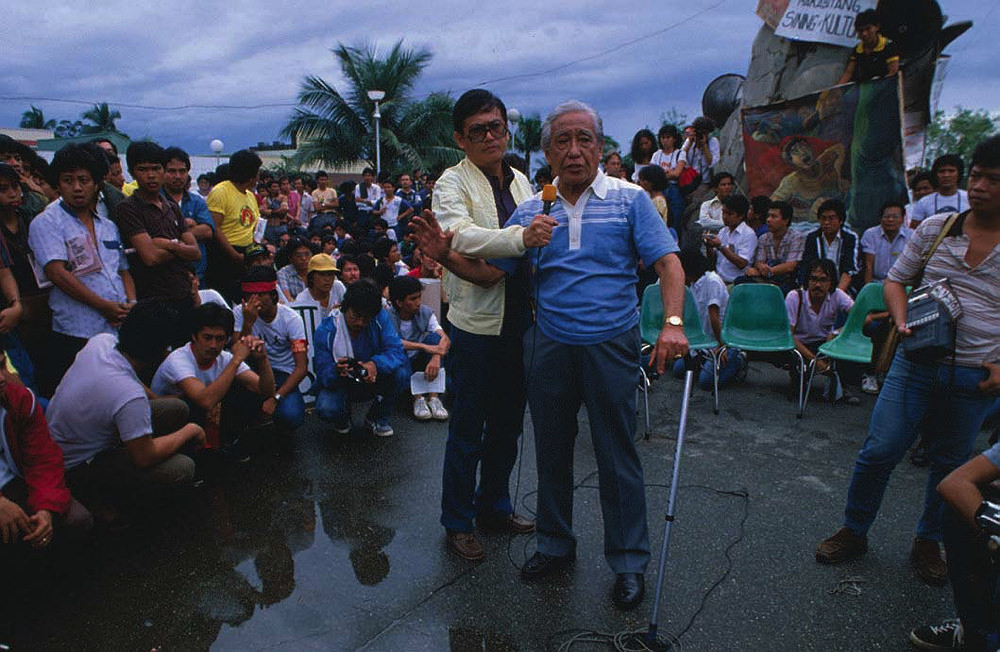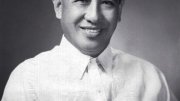“Have you known how it feels to be tear-gassed?” the 86-year-old former senator shouted at police chiefs and generals after a September 1985 demonstration in Manila. Lorenzo M. Tañada, LL.M. ’28, had joined what he called “the parliament of the streets,” marching against the antidemocratic rule of Philippine president Ferdinand Marcos and the regime’s ties to the United States. That was Tañada’s first encounter with tear gas, but not the first protest by the lifelong advocate for human rights, peace, and national sovereignty. Across the twentieth century, he fought to give the Philippines a different, more independent future.
Born the week U.S. warships conquered Spain’s navy and seized the Philippines as a colony, Tañada grew up as U.S. forces crushed the nascent Philippine Republic. Young Tanny avidly studied Philippine history, but, encouraged by his prosperous parents, he aimed at success on American terms: he won English-language speaking contests, played basketball and soccer, and attended the University of the Philippines, founded by the colonial government. He arrived at Harvard Law School in August 1927 with other pensionados: talented, ambitious Filipinos sent to universities in the United States.
“I never knew what I was in for until I got to Harvard,” he said later. “The professors there certainly squeezed your brains dry.” The research papers submitted for his master’s considered “The Power of the Governor General of the Philippine Islands” (too strong) and “The Regulation of Public Service Corporations in the Philippine Islands” (too weak). In class, he impressed Professor Felix Frankfurter, who, busy defending anarchists Nicola Sacco and Bartolomeo Vanzetti, inspired Tañada in turn: Frankfurter “was not afraid to defend what looked like a lost or hopeless case,” his student wrote. Tañada recalled anti-Asian discrimination in Cambridge, but kept his head down. He missed his wife, Dading, whom he had married just before leaving Manila, and may have been homesick; a generation later, he shipped his son Bobby, then studying at Harvard, a case of their country’s beloved San Miguel beer.
Once back home, Tañada built a private law practice and in 1937 helped found the Civil Liberties Union of the Philippines, to fight for workers’ rights, free speech, and immediate independence for the colony. In 1942, as Japanese troops marched into Manila, CLU leaders met at his house and risked their lives to form Free Philippines, a covert guerrilla movement that collected intelligence and published an underground newspaper. After the war, Tañada prosecuted collaborators through the Filipino People’s Court, a special tribunal established on the eve of Philippine independence in 1946. Witnesses feared testifying against powerful figures, and Tañada had few resources, but he refused U.S. aid. “No American,” he announced, “can prosecute my countrymen.” From his U.S. Supreme Court chambers, Felix Frankfurter shared his admiration for “men like you who devote themselves to the public good.” In 1947, Tañada won election to the Philippine Senate.
There he grappled with the fundamental dilemma of modern Philippine politics: were Filipinos better off with the Americans, or without them? Cold War statesman Carlos Romulo and West Point-educated future president Fidel Ramos argued that a fragile Asian republic needed to shelter under the U.S. umbrella. Tañada doubted it was “in the national interest for the Philippines to identify itself completely with…the United States,” and voters respected his economic nationalism, calls for international cooperation, and attacks on corruption until he retired from the Senate in 1971. He was in Europe in September 1972, when President Marcos declared martial law and imprisoned dozens of opposition politicians. Risking his life again, the 74-year-old returned to Manila to serve as personal attorney for several of them, including his longtime rival Benigno Aquino Jr.

Lorenzo Tañada as a protester—addressing a 1983 rally challenging International Monetary Fund policies toward the Philippine economy
Protest photograph from Bettmann/Getty Images
Tañada stayed out of jail (except briefly), and helped secure the 1980 release of Aquino, who taught at Harvard and MIT before returning home in August 1983—to be assassinated on his arrival. Tañada, more than anyone else, convinced a fractious opposition to rally behind Aquino’s widow, Corazon. The protestors’ increasing numbers, culminating in the 1986 People Power revolution, persuaded U.S. State Department officials that Marcos’s days were numbered.
Tañada, meanwhile, had begun the Anti-Bases Coalition in 1983, convinced that nothing undermined Philippine sovereignty more than the 1947 agreement extending U.S. control of 23 military bases built in the colonial period. Warning that U.S. facilities “expose us to nuclear attacks,” he had built global connections with fellow peace activists. “America is not a nation without heart and shame,” he wrote, but he warned Filipinos that “[n]o amount of money and military assistance should induce us to barter away our right to national survival.”
It took the 1986 revolution and the end of the Cold War, but Tañada’s long struggle culminated on September 16, 1991. The 93-year-old sat in the spectators’ gallery to watch the Philippine Senate vote 12 to 11 to close the bases. His son, now a senator, cast the deciding vote, and joined in as base opponents gave his father a standing ovation.
Three decades later, the burning issue—with America or without it—still shapes Philippine politics. Tañada offered a clear answer. But he also urged Filipinos to think more about what kind of country they wanted. “National survival,” he explained, “is premised on our moving forward as a progressive nation.”









